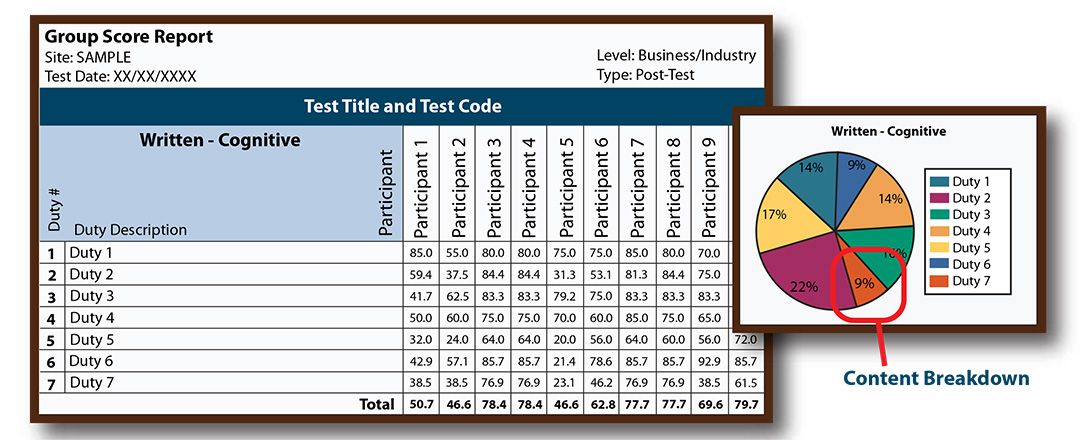No matter the industry, employees are the lifeblood of your organization. Your success (and growth!) depends on your ability to hire the right people and place them in the right positions.
Entry-level job assessments are a valuable tool to help you hire skilled candidates. Entry-level assessments (also called pre-employment tests) come in various shapes and sizes depending on the industry and the position you’re filling. In this post, we’ll explore the various types of assessments, benefits, and what you should look for in an assessment provider.
Types of Entry-Level Assessments
Skills assessments measure specific skills or competencies. While some tests are geared toward general employability skills, others focus on a particular industry or position like Industrial Maintenance Mechanic or a CNC Machinist. Skills assessments should be objective and reliable to give you the best information to make your hiring decision.
Knowledge tests evaluate current knowledge or mastery of a specific field. They are used for jobs that require specific expertise like a paralegal or investment advisor.
Personality tests are a bit more subjective and are often used to help determine if a candidate is a good culture fit.
Cognitive ability tests focus less on specific skills and evaluate a candidate’s problem solving, critical thinking, memory, and more.
Emotional intelligence tests measure a candidate’s self-awareness, empathy, and how they manage emotions and relationships.
Integrity tests evaluate the test taker’s dependability, ethics, and honesty.
Other kinds of tests like background checks or drug tests can also be used to screen applicants before hiring them.
Benefits of Entry-Level Skills Assessments
Entry-level assessments are more than a way to filter a pool of applicants. When used correctly, these tests are an objective way to evaluate a candidate’s skills and predict how likely they are to succeed on the job. A high-quality skills assessment is more predictive of job performance than relying solely on a resume or interview. Other benefits include:
- Objectively narrowing down the list of candidates
- Ensuring candidates have the right skills for the job
- Reducing overall time to hire
- Lessening the risk of making a bad hire
- Creating a more legally defensible hiring process
- Closing skills gaps
What to Look for in an Assessment Provider
The U.S. has many companies offering a variety of entry-level assessments. Options range from tests measuring basic skills like math and reading to more advanced skills like robotic programming and operating a CNC mill.
As with any standardized test, industry-specific tests must be thoroughly researched and tested to provide accurate and fair results consistently. If you’re searching for an assessment provider for skilled trade positions, we recommend looking for the following three characteristics.
1. Founded on Industry Standards
Industry standards define the skills and competencies needed for specific positions. Critical duties, skills, equipment, processes, materials, and more are documented during a job and task analysis. An entry-level skills assessment based on these standards gives employers a way to certify a worker has the specific skills for the job. Without this foundation, there’s an increased risk of hiring someone who isn’t qualified for a position.
2. Psychometrically Sound
Psychometric properties are critical in creating accurate, reliable, and legally defensible skills assessments. Two properties, reliability and validity, ensure a test produces consistent results and that it measures what it intends to measure. A test development process that includes psychometrics gives employers complete confidence that the assessment is fair, consistent, and accurately measures skills most important to the position.
3. In-Depth Score Reports
The data from an entry-level assessment is one of the keys to building a stronger, safer, more efficient workforce. Look for an assessment provider that provides in-depth score reporting.
Score reports from Nocti Business Solutions give details on each specific competency and how the candidate performed compared to national or state averages. This helps employers pinpoint the areas where a candidate may need more training.
For example, the Building Construction Occupations assessment is broken down into seven general topics. A candidate’s score report will include scores for each performance area and compare those scores to group, state, and national averages. If a candidate scored well on the electrical portion of the test but not well on the carpentry portion, you have some immediate insight into where to focus your training efforts.

Build a Skilled Workforce with NBS
Nocti Business Solutions has been helping employers solve their workforce challenges for over 20 years. We do this by offering tools like skills assessments that consistently and accurately identify workers’ skills and knowledge. Our entry-level assessments are based on industry standards and we have psychometricians on staff to help ensure the quality of every test.
In addition to over 170 “off the shelf” assessments, we can also create tests customized for your organization, equipment, and processes. We’ve worked with organizations like FANUC, Manufacturing Skill Standards Council (MSSC), and RV Technical Institute (RVTI) to create and maintain skills assessments based on industry standards.
View our Assessment Index for a complete list of entry-level tests, or contact us with any questions.

Recent Comments